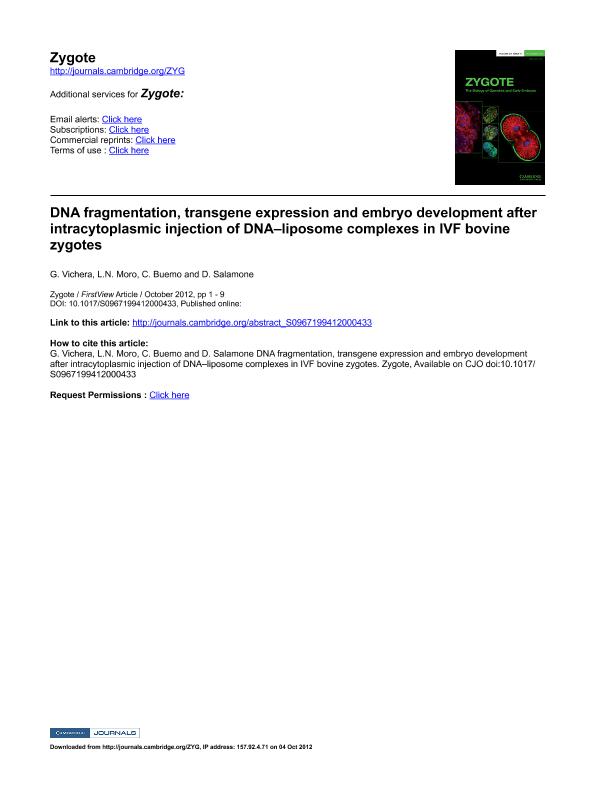Mostrar el registro sencillo del ítem
dc.contributor.author
Vichera, G.
dc.contributor.author
Moro, Lucía Natalia

dc.contributor.author
Buemo, C.
dc.contributor.author
Salamone, Daniel Felipe

dc.date.available
2023-05-17T11:13:27Z
dc.date.issued
2012-10
dc.identifier.citation
Vichera, G.; Moro, Lucía Natalia; Buemo, C.; Salamone, Daniel Felipe; DNA fragmentation, transgene expression and embryo development after intracytoplasmic injection of DNA-liposome complexes in IVF bovine zygotes; Cambridge University Press; Zygote; 22; 2; 10-2012; 195-203
dc.identifier.issn
0967-1994
dc.identifier.uri
http://hdl.handle.net/11336/197759
dc.description.abstract
Summary This study was designed to evaluate the quality and viability of bovine embryos produced by in vitro fertilization (IVF), after intracytoplasmic injection of pCX-EGFP-liposome complexes or pBCKIP2.8-liposome complexes (plasmids that codify the human insulin gene). Cleavage, blastocysts and expanded blastocysts rates of these both groups were not different from that of controls (IVF or IVF embryos injected with liposomes alone; IVF-L). The percentage of EGFP-positive (EGFP+) blastocysts was 41.8%. In Experiment 2, the blastocysts obtained after injection of pCX-EGFP-liposome complexes that did or did not express the transgene, were analyzed by TUNEL (terminal deoxynucleotidyl transferase dUTP nick-end labelling) assay at days 6, 7 and 8 of culture in vitro(Bd6, Bd7 and Bd8), in order to evaluate DNA fragmentation. The EGFP+ blastocysts showed different proportions of TUNEL-positive cells (T+) at Bd6, Bd7 and Bd8 (91, 73.7 and 99.5%, respectively) while blastocysts without EGFP expression (EGFP-) showed statistically lower numbers of fragmented nuclei (0, 44.6 and 85%, respectively; P < 0.05). There was no evidence of DNA fragmentation in either Bd6 or Bd7 IVF and IVF-L control blastocysts, but T+ nuclei were detected at Bd8 in both groups (66.4 and 85.8% respectively). Finally, IVF blastocysts (n = 21) injected with insulin-liposome complexes, cultured for 6, 7 and 8 days, were transferred to recipient cows. Pregnancy rates of 18.2% (2/11) and 40% (2/5) resulted from the transfer of Bd6 and Bd7 cells, respectively. Two pregnancies developed to term but they were not transgenic for the insulin gene. In conclusion, EGFP expression affects DNA integrity but not embryo development. Moreover, additional transfers are required in order to overcome the drawbacks generated by in vitro culture length and transgene expression.
dc.format
application/pdf
dc.language.iso
eng
dc.publisher
Cambridge University Press

dc.rights
info:eu-repo/semantics/openAccess
dc.rights.uri
https://creativecommons.org/licenses/by-nc-sa/2.5/ar/
dc.subject
BOVINE
dc.subject
DNA FRAGMENTATION
dc.subject
IN VITRO FERTILIZATION
dc.subject
LIPOSOME
dc.subject
TRANSGENE EXPRESSION
dc.subject.classification
Tecnologías que involucran la manipulación de células, tejidos, órganos o todo el organismo

dc.subject.classification
Biotecnología de la Salud

dc.subject.classification
CIENCIAS MÉDICAS Y DE LA SALUD

dc.title
DNA fragmentation, transgene expression and embryo development after intracytoplasmic injection of DNA-liposome complexes in IVF bovine zygotes
dc.type
info:eu-repo/semantics/article
dc.type
info:ar-repo/semantics/artículo
dc.type
info:eu-repo/semantics/publishedVersion
dc.date.updated
2023-05-16T14:45:09Z
dc.journal.volume
22
dc.journal.number
2
dc.journal.pagination
195-203
dc.journal.pais
Reino Unido

dc.journal.ciudad
Cambridge
dc.description.fil
Fil: Vichera, G.. Universidad de Buenos Aires. Facultad de Agronomía. Pabellón de Zootecnica. Laboratorio de Biotecnología Animal; Argentina
dc.description.fil
Fil: Moro, Lucía Natalia. Consejo Nacional de Investigaciones Científicas y Técnicas. Oficina de Coordinación Administrativa Parque Centenario; Argentina. Universidad de Buenos Aires. Facultad de Agronomía. Pabellón de Zootecnica. Laboratorio de Biotecnología Animal; Argentina
dc.description.fil
Fil: Buemo, C.. Universidad de Buenos Aires. Facultad de Agronomía. Pabellón de Zootecnica. Laboratorio de Biotecnología Animal; Argentina
dc.description.fil
Fil: Salamone, Daniel Felipe. Universidad de Buenos Aires. Facultad de Agronomía. Pabellón de Zootecnica. Laboratorio de Biotecnología Animal; Argentina. Consejo Nacional de Investigaciones Científicas y Técnicas. Oficina de Coordinación Administrativa Parque Centenario; Argentina
dc.journal.title
Zygote

dc.relation.alternativeid
info:eu-repo/semantics/altIdentifier/doi/http://dx.doi.org/10.1017/S0967199412000433
Archivos asociados
